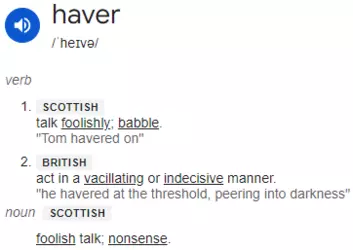The former Archbishop of Canterbury, Rowan Williams, has
written a decidedly negative review of Peterson's latest book
We Who Wrestle With God (
archive), describing Peterson as "a culture warrior out of his depth".
Ouch.
Good read. Thanks for linking.
I learned a new word: "haver", from this passage:
"Two points to begin with. One is that Peterson remains ambiguous about what many would consider a fairly crucial issue: when we talk about God, do we mean that there actually is a source of agency and of love independent of the universe we can map and measure? Faith is “identity with a certain spirit of conceptualization, apprehension, and forward movement”, he writes in relation to Noah; it amounts to “a willingness to act when called on by the deepest inclinations of his soul”. Echoes here not only of Jung, who figures as a key source of inspiration, but of the radical 20th-century Protestant theologian Paul Tillich, who proposed redefining God as whatever is the focus of our “ultimate concern”. Some passages imply that God is identical to the highest human aspirations – which is not quite what traditional language about the “image of God” in humanity means. Peterson seems to haver as to whether we are actually encountering a real “Other” in the religious journey."
By googling "to haver meaning" I get this result:

As you can see, its scottish usage is somewhat harsh. Now, haver can also mean to be "indecisive", "to hem and haw" and "to equivocate; vacillate", which aren't quite as derogatory in their meaning.
Since Rowan Williams is Welsh, perhaps the intended meaning of the usage of the word here isn't meant to be of the scottish variant, but I still got a good laugh when I searched for the maning of the word! :-)
Anyways, the review paints Peterson's work as being pretty much exactly the way you'd expect it to be: ambitious, ambiguous and
havering. Without having read Peterson's book, I can still make a good guess as to its structure and quality by reasing what mr. Williams has to say about it.
This part made me smile as well:
"Well, there is certainly a discussion to be had about toxicity in parenting, but finding it in the second chapter of Genesis requires impressive single-mindedness (and it is worth noting that Jewish exegetical tradition, unlike Christian, has never been that interested in Eve)."
I was surprised with this comment from the bishop, though:
"Predictably (for those familiar with his online battles), he sees any qualification of the simple binary of gender identity as equivalent to denying the difference between good and evil, a refusal of the basic polarities of reality. But most serious discussions of gender fluidity do not deny evolutionary biology or sexual differentiation as such; they are asking for a more painstaking attention both to the social construction of roles and to the specifics of dysphoria. They deserve a better level of engagement."
This coming from such a devout and learned catholic was unexpected to me. Since it's clear from the review that Rowan Williams does not hold Peterson's book in particularly high regard, I'm pondering whether or not this somewhat defencive stance for the legitimacy of gender dysphoria as a topic to be seriously and earnestly discussed on its own merits stems from mr. Williams just wanting to throw some shade on Peterson, and/or whether he's actually sympathetic to the plight of transsexuals? Regardless, it's interesting the see Petersons main points in the book be questioned at every turn. Rowan Williams really does not care for it, but does a good job in not being too snarky about it. He seems to be content to be on point with the books supposedly many flaws.
At any rate, I also take notice of this choice of words at the very beginning of the review, regarding Petersons character:
"The temptation is to respond not to the work but the person (or persona): irascible, derisive, uncompromising, contrarian."
Peterson really are those things. It seems to me that he didn't used to be, though. The word "irascible" in particular is very painting of how Peterson is nowadays: he has a clear tendency to be easily angered. He's often quick-tempered and not very sympathetic in the way he expresses himself.
I wonder if Peterson would respond to a review such as this, what with it being written by a former Archbishop and all?



